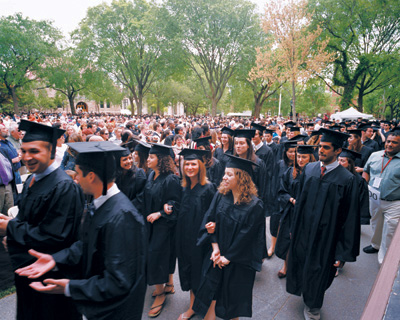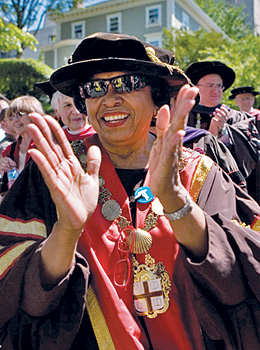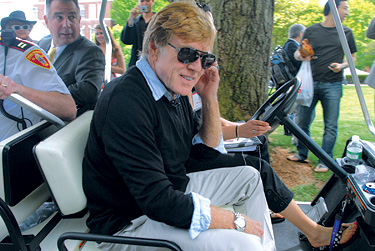"Don't trust anyone over thirty," activist Jerry Rubin famously warned in the 1960s. But judging by this year's Commencement and Reunion weekend, May 23–25, that generational split has gone the way of parietals and panty raids. All weekend, all over College Hill you could overhear parents (many of them alumni, to judge by their name tags) and soon-to-be graduates talking into cell phones, arranging to meet at the Brown Bookstore, at Starbucks, or at Campus Dance. Student panelists listened avidly at a Commencement forum to the stories of former activists Elliott Maxwell '68 and Bob Cohen'68, who suggested that Brown had escaped the violence that flared on other campuses during the Vietnam War because the chaplains, faculty, and administrators had communicated so well with students. Maxwell drew a laugh when he described arriving at a panty raid unsure what it would involve only to find the dean of the College in attendance. "It was not your normal panty raid," Maxwell said, laughing. His fellow panelist Ariel Werner '09 marveled: "I didn't think panty raids were real."

Some of the stories imparted to graduates were more wrenching. At the Alpert Medical School's Commencement exercises Sunday morning, Nils Daulaire, who heads the Global Health Council and whose daughter was graduating, described his introduction to real poverty as a young physician in Bangladesh, where he presided over the death from sepsis of a young pregnant woman who was brought to the hospital too late for care. She died of poverty, he said: because there were no roads, because she had no access to family planning, because she had no power in a patriarchal society. "The worst health care problems migrate down the social ladder," he warned the seventy new MDs. "This is real trickle-down economics." Noting that the majority of new MDs are women, he challenged the new Brown doctors: "Ladies, start your engines!"
If the weekend felt free of contention, it was rife with competition—for time. Brown is unusual in holding reunions and Commencement the same weekend, and 350 events were scheduled over the course of just three days and two nights. Seniors brought their extended families for the entire weekend, starting with Campus Dance, which has burgeoned into a three-ring event with tents for reunion-class dinners on the front green, big band music on the College Green, and a younger, hipper dance scene on Lincoln Field.

Saturday morning the dance floors receded and 11,000 folding chairs faced the stage where the Commencement exercises would be held. All day long visitors drifted across campus, riffling through the printed schedule to figure out where the next forum or dance performance or reception or meal would be held. As usual, President Ruth Simmons wowed and entertained parents and alumni at her annual Saturday Alumni Hour with the President (see page 26) and accepted a Brown Annual Fund check from the senior class for $66,888.52. She announced that gifts from alumni in reunion classes this year had thus far totaled $110,827,550.
At Field Day Saturday afternoon, school-age kids played soccer at Erickson Field while toddlers listened to a storyteller and pockets of teenagers compared high school experiences. Nearby, their parents balanced box lunches and conversation: What year is your son in? Where's your daughter going to college? You're retiring? Really?
Sunday morning dawned crisp and clear. On the College Green, a ring of sixty-one flags symbolizing the home countries of the graduating students rippled and glowed vibrantly against the brilliant blue sky and the fresh green of new elm leaves. Alumni gathered in front of University Hall to march down College Hill, where they would welcome into their ranks the newest generation: the class of 2008, whose members hooted and hollered in their shiny black robes and mortar boards, teetering on spiky heels and flapping in flip flops as they exited the Van Wickle Gates and entered the real world.
--Charlotte Bruce Harvey
The Envelope, Please
Seven receive honorary degrees.
Doctor of Letters
Edwidge Danticat '93 MFA is the author of widely acclaimed novels and nonfiction, including the memoir The Dew Breaker, the Oprah Book Club selection Breath, Eyes, Memory, and two National Book Award finalists, Krik? Krak! and Brother, I'm Dying, which won the National Book Critics Circle Award.
Doctor of Fine Arts
Judith Jamison be-gan dancing with the Alvin Ailey American Dance Theater in 1965 and was named artistic director in 1989. In 1999 she received the Kennedy Center Honor for her lifetime contributions to American culture.
Doctor of Humane Letters
Matthew J. Mallow '64 headed the corporate finance department of Skadden, Arps, Slate, Meagher & Flom LLP and is a former chair of the Committee on Securities Regulation of the New York City Bar Association. He has served on the Brown Corporation for seventeen years, the past ten as treasurer, and cochairs Boldly Brown, the Campaign for Academic Enrichment, which has raised $1.2 billion toward its $1.4 billion goal.
Doctor of Fine Arts
Robert Redford reached stardom on screen and went on to direct and produce movies, winning an Oscar for Ordinary People. He founded the Sundance Institute to support emerging filmmakers and independent cinema. As a conservationist, Redford was a trustee of the Natural Resources Defense Council and founded the Institute for Resource Management. In 2005 the Kennedy Center honored him for "distinguished achievement in the performing arts" and "extraordinary contributions to the life of our country."
Doctor of Science
Shih Choon Fong is president of the National University of Singapore and one of the world's most highly cited researchers in engineering. He was a member of the Brown faculty from 1981 to 1997. He will become founding president of Saudi Arabia's King Abdullah University of Science and Technology on December 1.
Doctor of Humane Letters
Wendy J. Strothman '72 ran Beacon Press and Houghton Mifflin's Trade and Reference Division before founding the Strothman Agency, where she represents such writers as Anthony Lewis and Philip Roth. Elected to the Brown Corporation in 1990, she has served as a trustee, fellow, and, for the last ten years, secretary of the Corporation. She created the Wendy J. Strothman Faculty Research Award in the Humanities.
Doctor of Science
Maria T. Zuber '86 PhD is the E.A. Griswold Professor of Geophysics at MIT. The topographic map of Mars produced by her laser altimeter is the most accurate model for any planet. She has been honored by NASA and many scientific organizations, and in 2002 Discover named her one of the fifty most important women in science.
Walk Softly...
... But change the world, Dave Eggers advises graduates.
"Man, am I nervous!" said writer and publisher Dave Eggers as he mounted the pulpit of the First Baptist Church in America to deliver the Baccalaureate address to the seniors on Saturday afternoon. "Anyone else not sleep last night?"
Three years ago, Eggers received an honorary doctorate from Brown, which he now refers to as "my almost–alma mater." Eggers, who founded the independent publishing house McSweeny's and kick-started his writing career with the Pulitzer-nominated A Heartbreaking Work of Staggering Genius, described the serendipitous beginnings of his third career—this one as a teacher. He founded 826 Valencia, a storefront writing and tutoring lab in San Francisco's Mission District, and has since replicated its success in six other cities across the United States. With his writing students, Eggers edits books, including the Best American Nonrequired Reading series. But all that success did not seem to calm him as he stood there in his pouffy velvet hat and cowl.
"Nurture serendipity," he urged the graduates. "Be soft-walking revolutionaries ... but revolutionaries nonetheless."

Ruth Simmons, Unplugged
Snippets from the Alumni Hour with the President
Who knew President Ruth Simmons could deliver such great one-liners? But there she was at a gathering with a few hundred alumni, wisecracking and working the crowd. These are some of the funniest moments—with a few serious ones thrown in for good measure—from her annual hour with alumni.
On updating the undergraduate curriculum: "We're not taking away from students the ability to make mistakes. They still do that plenty."
On admission: "We simply cannot accept students on the basis of how wealthy they are. We need to do so on the basis of their intelligence, their talents, their experience."
On community: "The important thing is for every single student who comes to Brown to feel and in fact to know they belong here."
In response to a crying baby in the audience: "You don't need to take him out. We love crying babies."
On the Ivy League: "I just want to note that the person who used the words Harvard and perversity in a statement was not me."
Asking alumni to mention Brown in media interviews: "If you're doing something good, we want you to mention Brown. If you're not, leave us out."
The Natural

College-dropout Robert Redford lands an honorary doctorate.
The most popular spectator sport at this year's Commencement was undoubtedly spotting that famous mane of sandy hair. Honorary-degree recipient Robert Redford could be seen up close and personal both at Sunday's Commencement exercises and at a Saturday forum under a tent on Lincoln Field. Redford was chauffeured around campus in a souped-up golf cart that was besieged by students and alumni hoping to get an autograph. (Hey, weren't the students supposed to be getting all the attention?).
Redford, the seventy-one-year-old star of Butch Cassidy and the Sundance Kid, The Sting, and All the President's Men, displayed his characteristic humility, describing his honorary degree as "an insult to higher education, given my own academic accomplishments." In his Saturday forum, he recalled dropping out of the University of Colorado in the late 1950s after deciding, "My education was going to happen by getting out in the world." (He also lost his scholarship for excessive drinking.) Asked what course he would most like to teach at Brown, he answered, "Gym."
Redford said his real reason for coming to Brown was to honor his uncle, David Redford '40. As an undergraduate, David was on the dean's list, played baseball for two years, and was recruited by the St. Louis Browns. Robert Redford said his uncle was a surrogate father to him, teaching him to play football and baseball. David Redford died in the Battle of the Bulge at age twenty-three. His nephew was a child at the time. "I'm here today because I feel he did not get that honor and courtesy of ever being able to return to Brown," Redford said.
Redford was awarded a doctor of fine arts not just for his work in Hollywood, but also for his commitment to environmental causes and his role in founding the Sundance Institute and Film Festival, which has helped create a new generation of daring, independent filmmakers. At Commencement, Redford said he hadn't expected to speak but was prodded at the last moment by President Ruth Simmons. Referring to the customary four-cornered black velvet cap worn by honorary degree recipients, Redford told the graduates, "I tip my weird hat to you."
The New News on the Moon
Maria Zuber '86 PhD tells why we need to go back to the moon.
"My hope," Maria Zuber says, "is that over the next decade we will know as much about the moon as we know about Mars now."
Zuber, who chairs MIT's department of earth, atmospheric, and planetary sciences, was on campus to receive an honorary doctorate (see page 25). Over the past decade, attempts to land spacecraft on Mars have gone from missing the planet entirely, to violently crashing onto it, to delivering rovers safely onto precisely plotted landing sites. A portion of Zuber's work has been central to this accomplishment.
Now, thirty-five years after the last Apollo mission, Zuber, like many planetary scientists, wants us to return to the moon, and her Commencement forum was all about why. "After spending the last decade on Mars," she says, "we know much more about Mars than we do about the moon." What we do know is that the moon, like the Earth and other planets in our solar system, is about 4.5 billion years old. Although no one knows where the moon came from, the most credible theory is that early in the life of our solar system, a celestial object about the size of Mars collided with the Earth. The impact melted both the Earth and the object that collided with it, sending off debris that, trapped by the new, larger Earth's gravitational pull, formed the moon.
Thanks to weather, atmosphere, and plate tectonics, the Earth continued to evolve, but the moon stayed the same, offering a sample of what our planet was like billions of years ago. "If you want to know what the early Earth was like," Zuber says, "you need to look at the moon."
Zuber, who is the principal investigator for a 2011 U.S. mission to send two orbiters to the moon, says that an international competition is under way to conduct research on the moon and even, perhaps, site human colonies there. "Every space-faring country in the world is sending something to the moon," she says.
But can we afford moon exploration? Zuber argues that "some amount of the gross national product should go toward grand projects." She says she knows many engineers who chose that profession "because they stayed up to watch Apollo landings and later decided to take the hard math instead of the easy one."
White Paper Activism
A forum brings together protestors from across generational lines.
"People think today's students are apathetic, said Scott Warren '09 at a Commencement forum on activism. But that stereotype misses the point, he said; instead of throwing bricks, his peers are engaged in "white paper" activism. "They're more practical and they're working with authorities to effect change." Warren directs STAND, a national group striving to stop the genocide in Darfur. Partly because of STAND's work, Brown became the fifth U.S. university to withdraw its investments in companies that support the Sudanese government. In turn, Providence became the first city to divest, and Rhode Island has followed suit.
The forum brought together current student activists with those from the class of 1968, which was celebrating its fortieth reunion. As a student, Bob Cohen '68 organized the Campus Action Council, an umbrella group that encompassed antiwar protesters, members of Students for a Democratic Society, and others embracing left-wing causes."There was a civility at Brown and a trust that couldn't have been going on at Columbia or Berkeley, given what happened there," he said, noting that one of the chaplains testified at his draft board hearing, helping Cohen earn conscientious objector status.
Forty years younger, Ariel Werner '09 said she came to Brown fully expecting to become an activist. "The question wasn't whether I'd be involved, but where," she said. Her arrival on campus coincided with a debate over the justice of withholding voting rights from former felons, and she has spent much of her time at Brown working for prison reform. The Swearer Center has given her funding to teach in the Rhode Island Adult Correctional Institute.
University Professor Emeritus George Morgan took no credit for student activism, but his interdisciplinary courses sowed the seeds for change. The New Curriculum came out of a Group Independent Study Project Ira Magaziner and Elliot Maxwell, both '68, organized.
To prompt campus discussion of the curricular changes they proposed, Maxwell said, "We mixed sex and education." He and his friends laid out stacks of 500 copies of each page along the walls of Sayles Hall and cajoled their fellow students to collate. "If you helped," Maxwell said, "you could get into this mixer afterwards."
Growing Pains
Humans need to quit acting like adolescents, says reporter Andrew Revkin '78.
We may think the human race is an advanced species, but according to New York Times environment reporter Andrew Revkin we're stuck in puberty. Like adolescents, Revkin said at a forum on climate change and global warming, humans have pursued economic and industrial growth with a reckless look-what-I-can-do attitude—not thinking much about our impact on the environment.
"Science," Revkin said, "is like the grown-up in the room saying, 'I don't know about that. Be careful.'"
Author of the Times blog "Dot Earth" (dotearth.blogs.nytimes.com) and two books, The North Pole Was Here and The Burning Season, Revkin said he is hopeful that the species can grow up. But, he said, "we're totally unengaged" in research on alternatives to generating energy with fossil fuels, even though they're a major cause of global warming. The West may be shielding itself from the effects of climate change with wealth and technology, he argued, but the poorest countries will remain vulnerable. "The bottom line is that the worst impact will be on Malawi, not Massachusetts," he predicted.
Pearl Harbor and Band Practice
Putting 117 years of the Brown Daily Herald online.
"It's U.S. history through the eyes of Brown students. The day after Pearl Harbor there's band practice," said former Brown Daily Herald editor-in-chief Mary Catherine Lader '08, referring to a fragile paper copy of a December 1941 issue of the paper.
With former Herald senior editor Anne Wootton, who graduates next winter, and Patrick Yott, who directs the University Library's digitization drive, Lader gave a forum on a $10,000 pilot project to digitize and put online a searchable archive of 117 years of the paper. (Herald alumna Kristie Miller '66 funded the project.) For the pilot (http://dl.lib.brown.edu/dbdh), the group chose sample pages from key time periods, including the early years of the paper, both World Wars, and the late 1960s. To digitize the Herald's entire 117-year history will cost about $300,000, Lader said.
Wootton read from a few sample pages. In the early twentieth century, all incoming students were measured and weighed, and the Herald reported their vital statistics. "The men were an average of five-foot-nine, which seems a little short to me," she observed. "During World War I, varsity athletics were suspended," she continued, reading from the October 1, 1918, issue, which reported that 600 Brown men would be inducted as soldiers and sailors that day.
It's Ugly in There
A panel pulls back the curtain on comedy writing.
If there's one thing comedy writers have in common it's that they hate writing.
"The only thing I hate more than writing is people who love writing," said Kit Boss '83, a co–executive producer for ABC's Carpoolers. "I like having written," added Jonathan Groff '83, who's currently with CBS's How I Met Your Mother. Ian Maxtone-Graham '83, a co–executive producer of The Simpsons, recalled working on a show where the writers procrastinated by making bets with one another on such trivial things as how much change someone had in a pocket or what the weather might be like tomorrow. "Anything not to be writing," Maxtone-Graham said.
Back for their twenty-fifth reunion, the three classmates sat together on a panel moderated by Comedy Central executive vice president Lauren Corrao '83 and discussed the joys, misfortunes, and colossal frustrations of writing jokes for a living.
Maxtone-Graham, who started with The Simpsons more than a decade ago and helped write the recently released movie, recalled his start in the business. He'd spent six months unemployed and playing the video game Asteroids. "Finally you figure you have to do something," he said. "I got my start by being a journalist, a bad journalist. If I had been a good journalist, I'd still be with it."
Groff described the ugly reality of a group of writers charged with churning out a weekly show. "There's a lot of disgusting eating," he said. He remembered a game called "Baghead" that he and his fellow writers played: "You'd put a large grocery bag on your head and walk up to a guy and say 'Hit me as hard as you can.' It's really a moral test—how hard are you going to hit me?"
Boss said his agent once told him an NBC executive was hot for a Peruvian show called The Troubles With Women and wanted to develop it for a U.S. audience. When Boss watched the show, he was underwhelmed. "It was very generic," he said. Boss asked his agent what about it appealed to the NBC exec. "He hasn't seen the show," the agent replied. "He just loves the title."





